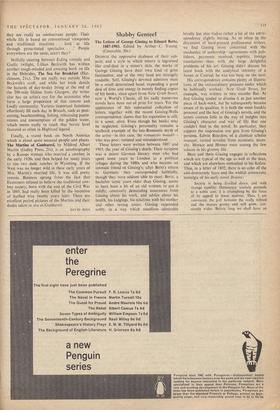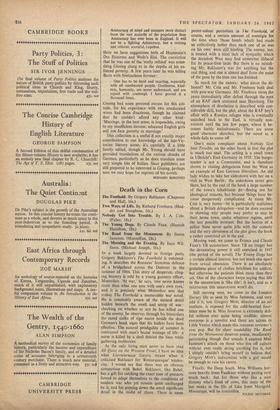Shabby Genteel
The Letters of George Gining to Eduard Bertz, 1887-1903. Edited by Arthur C. Young. (Constable, 30s.)
DESPITE the oppressive drabness of their sub- jects, and a style in which misery is ingrained like coal-dust in a miner's skin, the works of George Gissing have their own kind of grim fascination, and at the very least are strangely readable. Still, Gissing's devoted admirers must be a small determined band, expending a good deal of time and energy in merely finding copies of his books, since apart from New Grub Street, now a World's Classic, all his sadly numerous novels have been out of print for years. Yet the appearance of this substantial collection of letters, together with the recent Gissing-Wells correspondence, shows that his reputation is still, in a sense, alive. Even though his books may be neglected, Gissing's personality remains a textbook example of the late-Romantic myth of the artist—in this case, the romancier nutudit- who was poor, isolated and misunderstood.
These letters were written between 1887 and 1903, the year of Gissing's death. Their recipient was a minor German literary man who had spent some years in London as a political. refugee during the 1880s and who became an intimate friend of Gissing's; after Hertz's return to Germany they corresponded faithfully, though they were seldom able to meet. Hertz, a bachelor some years older than Gissing, seems to have been a bit of an old woman, to put it mildly, constantly demanding assurances from Gissing about his work, and advice about his health, his lodgings, his relations with his mother and other taxing issues. Gissing responded nobly, in a way which manifests admirable loyalty but also makes rather a lot of the corre- spondence slightly boring. A s so often in the discussion of hard-pressed professional writers, we find Gissing more concerned with the mechanics of authorship—agreements with pub- lishers, payments received, reprints, foreign translations—than with the large delightful problems of his art. Gissing didn't discuss his latest book with the analytical intensity of a James or Conrad; he was too busy on the next.
His correspondeifce contains plenty of illustra- tions of the extraordinary pressure under which he habitually worked: New Grub Street, for example, was written in two months flat. At first Gissing tended to dismiss it as just another piece of hack-work, but he subsequently became aware of its qualities. It is both the most frankly personal and the best of Gissing's novels, and the letters contain little in the ,way of insights into Gissing's character and way of life that one couldn't find in the novel. In particular, they support the impression one gets from Gissing's persona, Edwin Reardon, of a classical scholar manqué, turned novelist from economic neces- sity. Horace and Homer were among the few solaces in his gloomy life.
Here and there Gissing engages in reflections which are typical of the age as well as the Man, and which are elsewhere embodied in his fiction. Thus, in a letter of 1892, there is an echo of the anti-democratic fears and the wistful aristocratic nostalgia of his early novel Demos: Society is being levelled down, and with strange rapidity. Democracy scarcely pretends to a noble aim; it is triumphing by the force of its appeal to lower motives. Thus, I am convinced, the gulf between the really refined and the masses grows, and will grow, con- stantly wider. Before long we shall have an
Aristocracy of mind and manners more distinct from the vast majority of the population than Aristocracy has ever been in England. It will not be a fighting Aristocracy, but a retiring and reticent; scornful, Lopeless.
Here we have suggestions both of Huysmans's Des Esseintes and Wells's Eloi. The conviction that he was one of the 'really refined' was some- thing Gissing clung to in the depths of his en- forced poverty. A few years later he was telling Bertz with Nietzschean fervour: One has to be hard and exacting, especially with all uneducated people. Gentleness, kind- ness, humanity, are never understood, and are repaid with contempt. I have proved it a thousand times.
Gissing had some personal excuse for this atti- tude, for his experience with two uneducated wives had been disastrous, though he claimed that he couldn't afford any other kind: 'Marriage, in the best sense, is impossible, owing to my insufficient income; educated English girls will not face poverty in marriage.'
This collection is a useful if not exactly major contribution to our knowledge of the late-Vic- torian literary scene; it's carefully if a little fussily edited, though Mr. Young should have provided translations of the various chunks of German, particularly as he does translate some very simple bits of Italian. Since publishers are still prepared to be interested in Gissing, perhaps now we may hope for reprints of his novels.
BERNARD BERGONZI







































 Previous page
Previous page